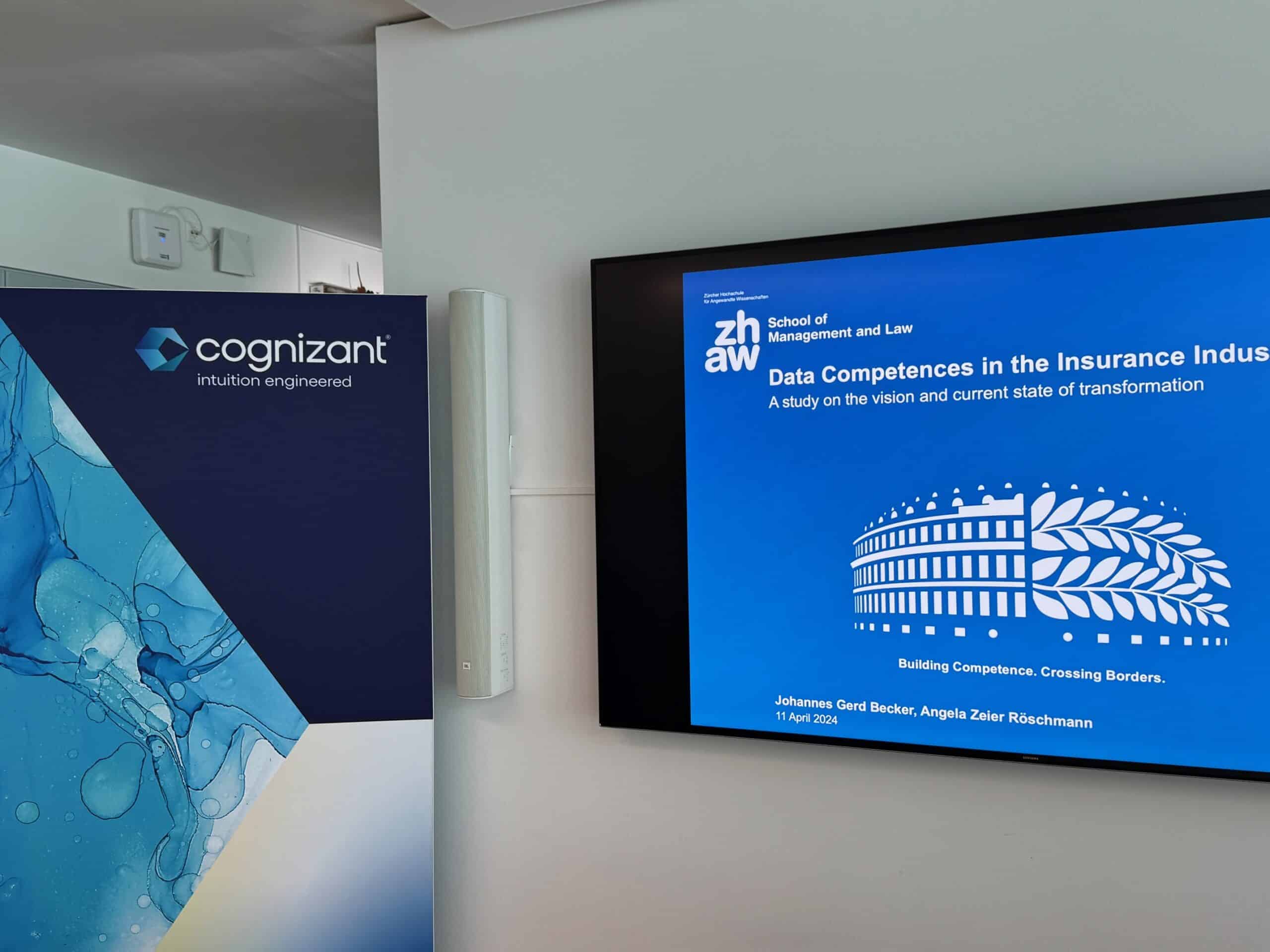ZHAW Data Competences study with Cognizant and AWS
18 April, 2024 | Aktuell Allgemein
On April 11, 2024 the study on the «Vision and Current State of Transformation in the Insurance Industry» was presented by the ZHAW School of Management and Law in collaboration with Cognizant and Amazon Web Services (AWS). Prof. Dr. Angela Zeier Röschmann and Dr. Johannes Gerd Becker led through the study in the offices of Cognizant at Prime Tower in Zurich.
Prof. Dr. Angela Zeier Röschmann answered the question of «why» a study on data skills was initiated by saying that insurers know how to handle data very well. What is new is that rapid technological progress has changed the way data is analyzed and predicted, as its potential has increased. Over the past two years, there has been a veritable hunt for use cases. At the moment, the enthusiasm that prevailed at the beginning has subsided somewhat, as everybody has already got to grips with ChatGPT, etc.
Forward-looking mode
According to the study, the turning point could be that the industry is now moving from data analysis to a more predictive mode. This means action-oriented data or the use of decision-oriented data. The study directors are surprised that the visions are fairly similar across the industry. Respondents want a 360-degree customer view and end-to-end processes, as well as much more efficient processes that are compliant. These aspirations can be achieved by combining insurance expertise with data management, data analytics and technology.
What does this mean for operations?
Advisors will work with intelligent leads and intelligent segmentation that they actually use, not just see on their screens. For underwriting, this will mean smarter risk selection than today, but also more individualized, dynamic pricing and a careful review of the wording of a policy. Everything available at the touch of a button. In claims settlement, automation is accelerating.
Sepp Ruchti, CDO Generali, who was sitting in the audience, summarized the most important findings from the study as follows:
- Bottom-up value creation: for sustainable AI success, companies need to move away from general top-down use cases and towards solutions that solve real problems faced by employees in the company.
- AI as a complement: The goal should not be complete automation, but rather the improvement of work processes along the value chain.
- New skills, new ways of thinking: Both building and effectively using AI solutions require new skills and adaptable ways of working.
The panel
Following the presentation, the invited data and business analysts Dr. Philipp Stucki, Project Manager and Business Analyst at Helvetia Insurance Switzerland, Dr. Johannes Gerd Becker, Professor of the Institute for Risk & Insurance ZHAW, Peter Wanda, CDO, Head Shared Services BU CH at Zurich Insurances, Dr. Jürg Schellendorfer, Lead Actuarial Data Scientist at Swiss Re, Dr. Matthias Brändle, Lead Data Strategy & Analytics Nearshore at Die Mobiliar, Christoph Winter, CDO at Allianz Suisse, Christian Richter, Senior Advisor Insurance Industry EMEA at Amazon Web Services (AWS). They addressed both the practical approaches and their value.

What potential do AI tools have?
At Zurich Insurance, the main focus is on improving customer relationships. With AI and new data insights, there are many more tools available to achieve this. Intelligent automation is an important part of this. Innovation will take place in various areas, such as agents who understand the product much better and are better prepared for the customer. The secret will be to convince the agents or the people in the call centers to use the new AI tools.
At Swiss Re, AI affects everyone. The focus is less on interaction with customers, as insurance is more of a B2B business. There is a strong focus on costs, where they can be more efficient thanks to AI. For products with generative AI and AI products in general, the question of their insurance arises. This is comparable to when nobody initially thought about cyber insurance.
Mobiliar sees AI and analytics as a strategic capability of its company. The insurer wants a culture in which employees breathe and think data. Mobiliar does not want to be data-driven, but information-driven. In September 2023, the insurer made its own Mobi-ChatGPT available to its employees, who can but do not have to use the tool. This can create, edit or summarize texts and also answer questions.
Where is AI used?
Insurers primarily use AI for efficiency cases. For example, for boring or repetitive processes or call center tasks. This makes work more interesting. Those who are better and faster at checking benefits and settling claims than the competition have a competitive advantage. Another important factor is the knowledge gained on how to improve recourse in the event of claims.
Babak Hodjat, CTO AI at Cognizant, who joined the discussion from the United States, also spoke of two ways of looking at the goals of promoting AI. First: AI makes us more productive, more efficient and generates a return on investment, or second: AI is a KPI. For the past year and a half, it has been observed that people trust AI systems and use them for tasks such as summarizing, writing a college essay or for translations. ChatGPT, Claude or Gemini are used routinely. In the insurance industry, not only end users but also decision-makers should be convinced to trust AI systems.
Future use of AI
If AI systems are reliable and of demonstrable benefit, their use will increase. The right areas of application for digitized workflows will save time. Generative AI requires employees with AI skills. The next generation will grow up with it and take AI for granted.
Binci Heeb
Read also: Women’s Day – Climbing the ladder and Women’s Day – Climbing the ladder (english)




